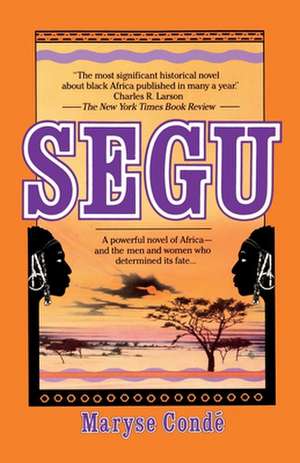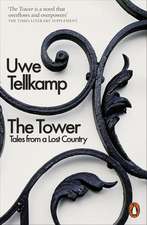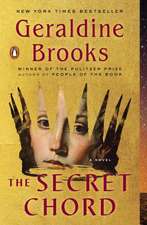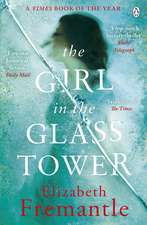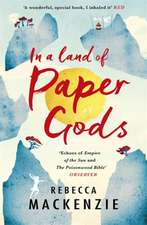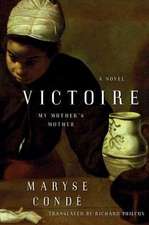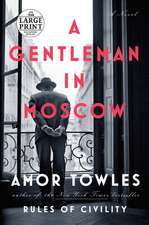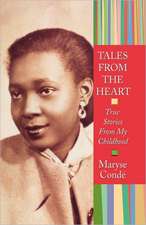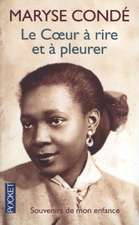Segu
Autor Maryse Condeen Limba Engleză Paperback – 29 feb 1988
"A wondrous novel about a period of African history few other writers have addressed... Much of the novel's radiance comes from the lush descriptions of a traditional life that is both exotic and violent."
-THE NEW YORK TIMES BOOK REVIEW
"Segu is an overwhelming accomplishment. It injects into the density of history characters who are as alive as you and I. Passionate, lusty, greedy, they are in conflict with themselves as well as with God and Mammon. Maryse Conde has done us all a tremendous service by rendering history so compelling and exciting. Segu is a literary masterpiece I could not put down."
-LOUISE MERIWETHER
| Toate formatele și edițiile | Preț | Express |
|---|---|---|
| Paperback (2) | 96.33 lei 3-5 săpt. | |
| Penguin Books – 31 aug 1996 | 96.33 lei 3-5 săpt. | |
| BALLANTINE BOOKS – 29 feb 1988 | 166.30 lei 3-5 săpt. |
Preț: 166.30 lei
Nou
Puncte Express: 249
Preț estimativ în valută:
31.84€ • 32.76$ • 26.84£
31.84€ • 32.76$ • 26.84£
Carte disponibilă
Livrare economică 08-22 februarie
Preluare comenzi: 021 569.72.76
Specificații
ISBN-13: 9780345353061
ISBN-10: 0345353064
Pagini: 512
Dimensiuni: 144 x 205 x 31 mm
Greutate: 0.65 kg
Editura: BALLANTINE BOOKS
ISBN-10: 0345353064
Pagini: 512
Dimensiuni: 144 x 205 x 31 mm
Greutate: 0.65 kg
Editura: BALLANTINE BOOKS
Notă biografică
Maryse Conde
Recenzii
"The most significant novel about black Africa published in many a year."
— The New York Times book Review
"Condé is a born storyteller."
— Publishers Weekly
“Exotic, richly textured and detailed, this narrative, alternating between the lives of various characters, illuminates magnificently a little known historical period. Virtually every page glitters with nuggets of cultural fascination.”
—Howard Kaplan, Los Angeles Times
“A wondrous novel about a period of African history few other writers have addressed. … Much of the novel’s radiance comes from the lush description of a traditional life that is both exotic and violent.”
—Charles L. Larson, The New York Times Book Review
“With the dazzling storytelling skills of an African griot, Maryse Condé has written a rich, fast-paced saga of a great kingdom during the tumultuous period of the slave trade and the coming of Islam. Segu is history as vivid and immediate as today. It has restored a part of my past that has long been missing.”
—Paule Marshall, author of Daughters
“Segu is an overwhelming accomplishment. It injects into the density of history characters who are as alive as you and I. Passionate, lusty, greedy, they are in conflict with themselves as well as with God and Mammon. Maryse Condé has done us all a tremendous service by rendering a history so compelling and exciting. Segu is a literary masterpiece I could not put down.”
—Louise Meriwether
“A stunning reaffirmation of Africa and its peoples as set down by others whose works have gone unnoticed. Ms. Condé not only backs them up, but provides new insights as well. … Segu has its own dynamic. It’s a starburst.” —John A. Williams
“A novel of wide scope, depth and power. Condé proves herself a careful observer of human behavior as she helps the reader to under stand and feel the turmoil of a confused continent. She captures a fascinating time in history with its earth spirituality, religious fervor and the violent nature of a people and their growing nation. . . Brims over with intelligence and wit.”
—Anniston Star (Alabama)
“Segu, a tale of love and intrigue, is fascinating, for the reader experiences the fervor of those tumultuous times.”
—Chattanooga News-Free Press
— The New York Times book Review
"Condé is a born storyteller."
— Publishers Weekly
“Exotic, richly textured and detailed, this narrative, alternating between the lives of various characters, illuminates magnificently a little known historical period. Virtually every page glitters with nuggets of cultural fascination.”
—Howard Kaplan, Los Angeles Times
“A wondrous novel about a period of African history few other writers have addressed. … Much of the novel’s radiance comes from the lush description of a traditional life that is both exotic and violent.”
—Charles L. Larson, The New York Times Book Review
“With the dazzling storytelling skills of an African griot, Maryse Condé has written a rich, fast-paced saga of a great kingdom during the tumultuous period of the slave trade and the coming of Islam. Segu is history as vivid and immediate as today. It has restored a part of my past that has long been missing.”
—Paule Marshall, author of Daughters
“Segu is an overwhelming accomplishment. It injects into the density of history characters who are as alive as you and I. Passionate, lusty, greedy, they are in conflict with themselves as well as with God and Mammon. Maryse Condé has done us all a tremendous service by rendering a history so compelling and exciting. Segu is a literary masterpiece I could not put down.”
—Louise Meriwether
“A stunning reaffirmation of Africa and its peoples as set down by others whose works have gone unnoticed. Ms. Condé not only backs them up, but provides new insights as well. … Segu has its own dynamic. It’s a starburst.” —John A. Williams
“A novel of wide scope, depth and power. Condé proves herself a careful observer of human behavior as she helps the reader to under stand and feel the turmoil of a confused continent. She captures a fascinating time in history with its earth spirituality, religious fervor and the violent nature of a people and their growing nation. . . Brims over with intelligence and wit.”
—Anniston Star (Alabama)
“Segu, a tale of love and intrigue, is fascinating, for the reader experiences the fervor of those tumultuous times.”
—Chattanooga News-Free Press
Descriere
Descriere de la o altă ediție sau format:
Conde depicts the Bambara of 1797, a kingdom in Africa flourishing before thecoming of Islam and slavery. The tale follows the Traore family, a noble clanentrusted by the king. The four Traore sons embody the contemporaneous forcestearing at the very fabric of the nation.
Conde depicts the Bambara of 1797, a kingdom in Africa flourishing before thecoming of Islam and slavery. The tale follows the Traore family, a noble clanentrusted by the king. The four Traore sons embody the contemporaneous forcestearing at the very fabric of the nation.
